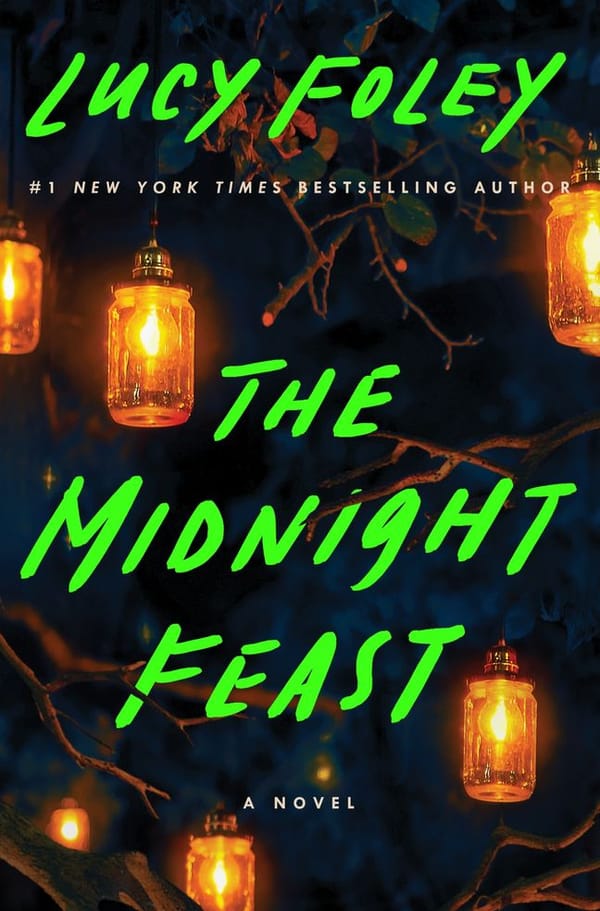Part 1: Doorways - The Quiet Death of Mr. Webber - The Book of Doors by Gareth Brown
In Kellner Books on the Upper East Side of New York City, a few minutes before his death, John Webber was reading The Count of Monte Cristo.

In Kellner Books on the Upper East Side of New York City, a few minutes before his death, John Webber was reading The Count of Monte Cristo. He was sitting at his usual table in the middle of the store with his overcoat folded neatly over the back of his chair and the novel on the table in front of him. He stopped for a moment to take a sip of his coffee, closing the book, and marking his place with a soft leather bookmark.
“How are you doing, Mr. Webber?” Cassie asked, as she made her way through the store with a stack of books under her arm. It was late in the day and Mr. Webber was the only customer.
“Oh, old and tired and falling apart,” he replied, as he always did when Cassie asked how he was. “But otherwise I can’t complain.”
Mr. Webber was a regular face in the bookstore and one of the customers Cassie always made an effort to speak to. He was a gentleman, softly spoken and always neatly dressed in what appeared to be expensive clothes. His age showed in the wrinkled skin of his hands and neck, but not in the smooth skin of his face or his full head of white hair. He was lonely, Cassie knew, but he carried it lightly, never imposing his loneliness on others.
“Reading The Count of Monte Cristo,” he confided, nodding at the book. The bookmark stuck out at Cassie like the tongue of a snake. “I’ve read it before, but as I get older, I find comfort in rereading favorites. It’s like spending time with old friends.” He coughed a self-deprecating laugh, signaling to Cassie that he knew he was being silly. “Have you read it?”
“I have,” Cassie said, hitching the pile of books up under her arm. “I read it when I was ten, I think.” She recalled long rainy days one autumn weekend when The Count of Monte Cristo, like so many other books, had taken her away.
“I don’t remember being ten,” Mr. Webber murmured with a smile. “I think I was born middle-aged and wearing a suit. What did you think of it when you read it?”
“It’s a classic, of course,” Cassie said. “But the bit in the middle, that whole section in Rome, that was too long. I always wanted to get to the revenge stuff at the end.”
Mr. Webber nodded. “He certainly makes you wait for the payoff.”
“Mmm,” Cassie agreed.
The moment expanded, the silence filled by the soft jazz music playing through the speakers on the wall.
“Have you ever been to Rome?” Mr. Webber asked, rubbing his hands together as if they were cold. Cassie knew that he had been a pianist and a composer before he had retired, and he had the sort of long, delicate fingers that would dance easily across a keyboard.
“Yeah, I’ve been to Rome,” Cassie said. “I don’t remember much about it.” She had spent a week in Rome years earlier when she had traveled around Europe and she remembered it well, but she wanted to let Mr. Webber speak. He was a man full of stories of a life well lived, a man with more tales than people to tell them to.
“I loved Rome,” he said, relaxing back into his chair. “Of all the places I traveled, and I traveled a lot, Rome was one of my favorites. You could walk around and just imagine what it was like five hundred years ago.”
“Mmm,” Cassie murmured again, watching as Mr. Webber’s attention drifted off into his memories. He seemed happy there.
“You know, I stayed in a small hotel near the Trevi Fountain,” he said, suddenly seized by a memory. “And they would bring me coffee in bed every morning, whether I wanted it or not. Seven a.m. sharp. A quick knock and then the old woman who ran the place would march in, bang it down on the nightstand, and march out again. On my first morning I was standing naked in the middle of the room just contemplating getting dressed, and then she burst in, coffee in hand. She gave me one look, up and down, thoroughly unimpressed by what she saw, and walked back out again.” He laughed at his memory. “She saw me in my . . . entirety.”
“Oh my god,” Cassie said, laughing with him.
He studied her as she laughed, drawing a conclusion. “I’ve told you that before, haven’t I?”
“No,” she lied. “I don’t think so.”
“You indulge me too much, Cassie. I’ve turned into one of those old people who bore youngsters with their stories.”
“A good story is just as good the second time around,” she said.
He shook his head, as if annoyed at himself.
“Do you still travel, Mr. Webber?” Cassie asked, pulling him away from his annoyance.
“Oh, I never go anywhere now,” he said. “Too old and too weak. I doubt I’d survive a long flight.” He clasped his hands over his stomach and stared at the table, lost in that thought.
“That’s a bit morbid,” Cassie said.
“Realistic,” he said, smiling. He looked at her seriously then. “It’s important to be realistic. Life is like a train that just keeps getting faster and faster and the sooner you realize that the better. I am hurtling toward the final stop, I know that. But I’ve lived my life and I’ve got no complaints. But young people like you, Cassie, you must get out and see the world while you can. There is so much to see beyond these four walls. Don’t let the world pass you by.”
“I’ve seen plenty, Mr. Webber, don’t worry about that,” Cassie said, uncomfortable with the conversation turning toward her. She nodded at the books under her arm. “Let me take these through the back before my arm falls off.”
She headed past the coffee counter—now closed for the day—and through to the windowless cave of boxes and staff lockers in the back room. She dropped the books on the cluttered desk for Mrs. K to deal with the following day when she opened up.
“Cassie, I wasn’t trying to tell you how to live your life,” Mr. Webber said, when she reappeared, his expression serious. “I hope I didn’t insult you.”
“Insult me?” Cassie asked, genuinely puzzled. “Don’t be silly. I didn’t give it a second thought.”
“Well, what I mean to say, really, is please don’t let Mrs. Kellner know that I was suggesting you might abandon her and her bookstore.”
“She would ban you for life,” Cassie said, grinning. “But don’t worry. I won’t say anything. And I’m not going anywhere anytime soon.”
As she tidied mugs and plates from the tables, Cassie looked around the store. It was everything a bookstore should be, with shelves and tables laden with books, soft music always playing in the background, and lights dangling on cables from the high ceiling, creating spots of brightness and cozy gloom. There were comfy chairs in corners and in between the shelves, and mismatched artwork on the walls. The paint hadn’t been redone in ten years, and the shelves had probably been first bought in the 1960s, but it felt appropriately shabby rather than rundown. It was a comfortable place, the sort of store that felt familiar the first time you stepped through the door.
She nodded down at Mr. Webber’s coffee cup. “Do you want a last refill before I close up?”
“I’ve had more than enough,” he said, shaking his head. “I’ll be up and down like an elevator all night to pee.”
Cassie pulled a face, half amused, half disgusted.
“I offer you a window into the life of an old person,” Mr. Webber said, unapologetic. “It’s a constant pleasure. Now, give me a few minutes to gather my strength and then I’ll be out of your way.”
“Take as long as you want,” she said. “It’s nice to have the company at the end of the day.”
“Yes,” Mr. Webber agreed, gazing down at the table, his hand resting on the cover of his book. “Yes, it is.” He looked up and smiled at her a little shyly. She patted him once on the shoulder as she passed. At the front of the store the large window spilled soft light out into the night, a fireplace in the dark room of the city, and as Cassie perched on her stool, she saw that it was starting to snow, flakes spiraling like dust motes through the haze of light.
“Lovely,” she murmured in delight.
She watched the snow for a while as it grew heavier, the buildings across the street a crossword puzzle of lit and unlit windows. Passersby pulled their hoods up and ducked their heads against the onslaught, and diners in the small sushi bar directly opposite Kellner Books peered out at the weather with chopsticks in hand and concern on their faces.
“The best place to enjoy a stormy night is in a warm room with a book in your lap,” Cassie said to herself. She smiled sadly because someone she missed had once said those words to her.
She glanced at the clock on the wall and saw that it was time to lock up. At his table Mr. Webber was sitting with his head tilted awkwardly to the side, like a man who thought he’d heard someone calling his name. Cassie frowned and a finger of unease tickled something deep in her gut.
“Mr. Webber?” she asked, rising from her stool.
She hurried across the store, the easy-listening background jazz jangling against her sudden unease. When she put a hand on Mr. Webber’s shoulder he didn’t respond. His expression was fixed, his eyes open and lifeless, his lips slightly apart.
“Mr. Webber?” she tried again, even though she knew it was pointless.
Cassie knew what death looked like. The first time that she had seen death, many years previously, it had stolen from her the man who had raised her and the only family she had ever known. Now death had come again, and this time it had taken a nice man whom she hardly knew while she had been distracted by the snow.
“Oh, Mr. Webber,” she said, as sadness swelled within her.
The EMTs came first, bustling noisily into the store and shaking snow from their clothes and hair. They were energetic, like there was a chance of saving Mr. Webber, but as soon as they saw him all of their urgency drained away.
“He’s gone,” one of them told her, and the three of them stood around in an awkward silence like strangers at a party. Mr. Webber watched nothing in the middle distance with glassy eyes.
Then the police came, a young man and an older man, both of them asking her questions as the EMTs lifted Mr. Webber from his chair and strapped him onto a stretcher.
“He comes in the evening, two or three times a week,” she explained to them. “Just before the coffee counter closes for the day. He gets a drink and then sits there and reads his book until I close up the store.”
The young police officer looked bored, standing with his hands on his hips and watching the EMTs as they worked. “Probably lonely,” he said.
“He likes books,” Cassie said, and the cop looked at her. “Sometimes we talk about books we’ve read, books he’s reading. He likes the classics.” She realized that she was prattling even as the words continued to tumble from her lips. She folded her arms to stop herself. Something about the police made her self-conscious, excruciatingly aware of everything she was saying and doing.
“Right,” the cop said, watching her with professional indifference.
“I guess he liked talking to you, ma’am,” the older cop said, and Cassie thought he was trying to be nice. He was thumbing through the contents of Mr. Webber’s wallet, seeking an address or next of kin. It seemed oddly obscene to Cassie, like rummaging through someone’s underwear drawer.
“Nothing like a pretty lady to give an old man something to look forward to,” the younger cop said, a mischievous smile tugging the corner of his mouth. The older cop shook his head in disapproval without looking up from Mr. Webber’s wallet.
“It wasn’t that,” Cassie snapped, her words sharp with irritation. “He was just a nice man. Don’t make it something it wasn’t.”
The young cop nodded an approximation of an apology but made no attempt to hide the loaded glance he then threw at his colleague. He walked to the door to hold it open for the EMTs.
“Here we go,” the older cop said, pulling out Mr. Webber’s driver’s license. “Apartment four, 300 East Ninety-Fourth Street. Nice neighborhood.” He returned the driver’s license to the wallet and folded the wallet shut. “We’ll let you know if we need any more information,” he said to Cassie. “But call us if you think of anything.” He handed her an NYPD business card with a phone number on it.
“Like what?” Cassie asked.
The cop shrugged loosely. “Just anything we need to know.”
Cassie nodded as if this were a good answer even though it wasn’t. “What about his family?”
“We’ll deal with that,” the older cop said.
“If he has any,” the younger cop added, waiting by the door. He wanted to go, Cassie saw; this was boring for him, and she hated him for it. Mr. Webber deserved better. Everyone deserved better.
“You gonna be all right, miss?” the older cop asked her. Everything about the man seemed tired, but he was still doing his job, and doing it better than his younger partner.
“Yeah,” Cassie said, frowning in annoyance. “Of course.”
He watched her for a moment.
“Hey, sometimes people just die,” he said, trying his best to say something consoling. “That’s just the way of it.”
Cassie nodded. She knew. Sometimes people just died.
Cassie stood at the front of the shop and watched them go, the ambulance first and then the cop car. Her own reflection was a ghost in the window—the tall, awkward girl dressed in thrift shop clothes: an old woolen crewneck sweater, and blue jeans that were almost worn through at the knees.
“Goodbye, Mr. Webber,” she said, absently pulling the sleeves of her sweater up to her elbows.
She told herself not to be sad—Mr. Webber had been old, and he had died peacefully and swiftly, it seemed, in a place that gave him joy—but her sadness was stubborn, a constant bass note rumbling in the background of her thoughts.
She picked up the phone and called Mrs. Kellner at home.
“Dead?” Mrs. Kellner said, when Cassie told her what had happened. The word was a bullet from a gun, a short, sharp bang.
Cassie waited, and she heard a long, tired sigh.
“Poor Mr. Webber,” Mrs. Kellner said, and Cassie could hear her shaking her head. “But there are worse ways to go. Certainly Mr. Webber would think so. How are you, Cassie?”
The question surprised Cassie, as it always did when someone inquired about how she was doing.
“Oh, I’m fine,” she lied, brushing it off. “Just shocked, I guess.”
“Mmm, well. It comes to us all, and Mr. Webber was a good age. It’s sad, but no reason to be depressed, you hear?”
“Yes, ma’am,” Cassie said, enjoying Mrs. Kellner’s robustly given kind advice.
“You lock up now and get on home. It’s a blizzard out there and I don’t want you getting hypothermia. That’s an instruction not a request.”
Cassie said good night to Mrs. Kellner and got to work tidying up, wondering how well the Kellners had known Mr. Webber. They seemed to know most people who came into the store regularly. Not that Mr. Kellner knew much of anything anymore, dementia having stolen his memories from him a few years ago. Cassie’s mind wandered, trying to remember when Mr. Kellner had last been in the store. It had been years, she was sure. Now Mrs. Kellner barely spoke about her husband at all.
When Cassie swept the floor around the coffee tables, around Mr. Webber’s seat, she saw his copy of The Count of Monte Cristo still lying on the table by the half-empty coffee cup. The sight of the book hit her like a punch in the gut, as if Mr. Webber had been taken away without his most prized possession. Then she saw another book next to it, a smaller book with a brown leather cover, faded and cracked like weathered paint on a door. Cassie hadn’t noticed the book earlier, not when Mr. Webber had arrived, not during all the activity with the EMTs and the cops. Had she just overlooked it?
She cradled the broom against her shoulder and picked up the book. It felt oddly light, as if it was more insubstantial than it should have been. The leather spine creaked pleasantly as she opened it. The pages were thick and coarse, and covered in what looked like scribbled text in dark ink, but in a language and script that Cassie didn’t recognize. As Cassie flicked through the book, she saw that there were sketched images and doodles as well, some dotted around the text, others taking up whole pages. It looked like a journal of some kind, a place where someone had collected their thoughts over many years, but chaotically so. The text didn’t run in a single direction; it was up and down and cutting through and curling around images.
On the very first page of the book Cassie saw a few lines, written in the same handwriting as the text on every other page, but in English:
This is the Book of Doors.
Hold it in your hand, and any door is every door.
Below those lines there was another message, written in a different script. Cassie gasped when she saw that it was a message to her:
Cassie,
This book is for you, a gift in thanks for your kindness.
May you enjoy the places it takes you to and the friends you find there.
John Webber
Cassie frowned, surprised and touched by the gift. She flicked through the pages again, stopping about a third of the way into the book where a single page had been given over to a sketch of a doorway. The doorway was penned in simple black ink, the door wide open, but through the opening Cassie saw what appeared to be a room in darkness, with a window on the far wall. Beyond that window was bright sunlight and a rich blue sky, the many colors of spring flowers in bloom among vibrantly green grass. Everything was sketched in black except the view from the window; that was drawn in full, glorious color.
Cassie closed the book, stroking the cracked leather.
Had she been so kind to Mr. Webber? Had he meant to give her the book that evening? Maybe he had taken it out of his pocket while she had been distracted by the snow, just before he had died?
She debated what to do for a moment, wondering whether she should call the cops and tell them about the book, both books. She could just see the younger cop rolling his eyes . . .“Some crazy person’s notebook he wanted to give to you . . . ?”
“Stupid,” she muttered to herself.
Mr. Webber had wanted her to have it. She would take it as a memento of the nice man who had often kept her company at the end of the day. And she would take his copy of The Count of Monte Cristo as well; she would see that it got to a good home.
When she left the store a short while later, wrapped up in her old gray greatcoat and burgundy scarf and bobble hat, the sharp edges of the wind cut into her, but she didn’t notice, so distracted was she by the contents of the odd notebook. After only a few steps she stopped under a streetlight and pulled the notebook from her pocket, entirely unaware of the figure watching her in the shadows of a doorway across the street.
She flicked through the pages again: more text, lines seemingly drawn at random as if the pages could be taken out of the book and placed together in a different order to reveal some grand, secret design. In the very center of the notebook she saw that a hundred or more doorways had been drawn in neat rows right across the two pages, each of them slightly different in shape or size or feature, as varied as the doorways on any street. It was odd but beautiful, enigmatic and inviting, and Cassie wanted to pore over the pages and dream about whoever it was that had spent so many hours scribbling in the book. It felt like a treasure to her, this book, a mystery to occupy her mind.
She wiped snowflakes from the pages and slipped the book back into her pocket, then started on her way through the snow-silenced streets, heading for the subway three blocks away, her mind alive with images and strange words scribbled in black ink.
The figure in the doorway did not follow.





